LSI Berlin Book Launch
Die Veranstaltungen finden in Präsenz und online via Zoom statt (hybrid). Wir freuen uns über Ihre Anmeldung per E-Mail an law-and-society@hu-berlin.de.
Kommende Veranstaltungen
24.11.2025 | 18:00 | Humboldt-Universität, Juristische Fakultät, Bebelplatz 2, 10117 Berlin, Raum E25
"Auf dem Weg zur Normalität? LGBTQ+-Familien und ihr Kampf um Anerkennung"
Book Launch mit Mona Motakef, Julia Teschlade, Christine Wimbauer und Silvia von Steinsdorff; mit einem Kommentar von Lucy Chebout.
01.12.2025 | 18:00 | Humboldt-Universität, Juristische Fakultät, Bebelplatz 2, 10117 Berlin, Raum E25
"Das Bevölkerungsargument"
Book Launch mit Dana Schmalz, Pauline Endres de Oliveira und Alexandra Kemmerer. In Kooperation mit dem Max-Planck-Institut für Ausländisches Öffentliches Recht und Völkerrecht in Heidelberg.
08.12.2025 | 18:00 | Humboldt-Universität, Juristische Fakultät, Bebelplatz 2, 10117 Berlin, Raum E25
"The Sciences of the Democracies"
Book Launch mit Norma Osterberg-Kaufmann und Lennard Gottmann. In Kooperation mit dem Lehrstuhl Theorie der Politik (Christian Volk) der Humboldt-Universität zu Berlin.
15.12.2025 | 18:00 | Humboldt-Universität, Juristische Fakultät, Bebelplatz 2, 10117 Berlin, digital
"Exekutiver Ungehorsam"
Book Launch mit Philipp Koepsell und Anna-Bettina Kaiser.
Vergangene Veranstaltungen

Der populistische Appell an das »Volk« und die Mobilisierung gegen die »Eliten« dominieren mittlerweile die Politik in vielen Ländern der Welt. Aber wo liegen die geschichtlichen Wurzeln dieser Politikform? Und wie hängt sie mit gesellschaftlichen Krisenprozessen zusammen? Welche Spielarten des Populismus sind zu unterscheiden und was ist ihr Verhältnis zu Demokratie und Verfassung? Kolja Möller verfolgt die Wege des Populismus, die bereits im 11. Jahrhundert beginnen und bis zu den jüngsten Konflikten im Zuge der Globalisierung führen, und er entwickelt eine umfassende Gesellschaftstheorie dieser Politikform. Ein unverzichtbares Buch, um die gegenwärtige populistische Welle zu verstehen.
Kolja Möller arbeitet als post-doctoral Researcher im Projekt "Legal Populism" an der Technischen Universität Dresden. Zuvor studierte er Politikwissenschaft, Philosophie und Öffentliches Recht an der Goethe-Universität Frankfurt am Main und promovierte 2014 an der Universität Flensburg mit einer Arbeit zum "Formwandel der Verfassung". 2021 habilitierte er sich ebenfalls an der Universität Flensburg mit einer zu "Popular Sovereignty and Society".
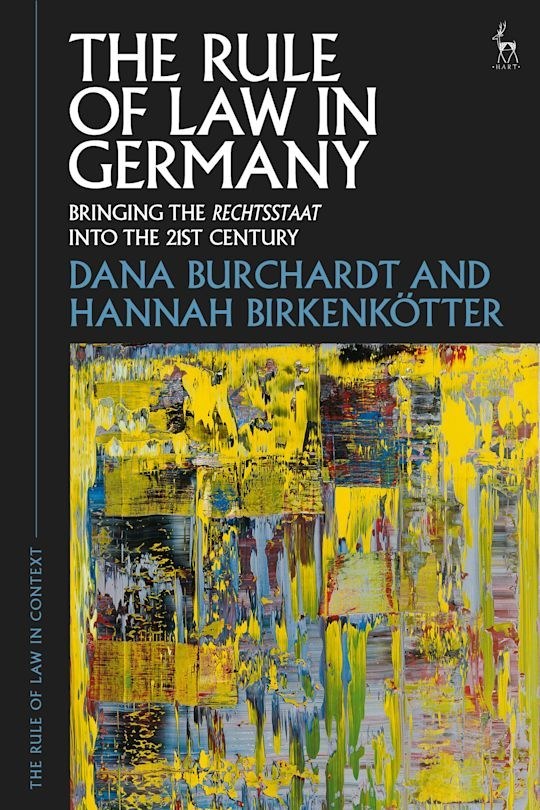
The book provides a comprehensive insight into rule of law experiences and discourses in Germany. It explores Germany's long rule of law tradition and highlights where the German state has fallen short of its rule of law promise, using historical and contemporary examples. It also shows that Germany's rule of law experience is tightly interwoven with European and international rule of law debates. By integrating historical, socio-legal and doctrinal perspectives, the book provides a nuanced account of a foundational principle in German constitutional thought.
Dedicated chapters explore the history and doctrine of the rule of law, challenges to the rule of law in today's Germany, the rule of law experience in the former German Democratic Republic and in the context of reunification, the relationship of the German rule of law practice with the rule of law on the European and international level, and the rule of law in times of crisis. This includes challenges to the rule of law through anti-terrorism measures, as well as the more recent COVID-19 pandemic and the so-called migration crisis, but also how the rule of law has been discursively (mis-)used in those situations. In concluding, the book highlights digitalisation as a challenge to the future of the rule of law in Germany.
Dana Burchardt vertritt im WiSe 2024/2025 den Lehrstuhl Prof. Martin Eifert. Sie ist zudem assoziierte Wissenschaftlerin am Max-Planck-Institut zur Erforschung von Gemeinschaftsgütern in Bonn. Bis September 2024 war sie wissenschaftlicher Mitarbeiterin an der Freie Universität Berlin im Kontext der DFG-Kollegforschungsgruppe "International Rule of Law - Rise or Decline?". In der Vergangenheit war sie u.a. Assistant Professor an der China University of Political Science and Law in Peking und wissenschaftliche Mitarbeiterin am Max-Planck-Institut für ausländisches öffentliches Recht und Völkerrecht in Heidelberg. Nach einer Promotion an der Freien Universität Berlin habilitierte sie sich an der Rheinischen Friedrich-Wilhelms-Universität Bonn (venia legendi: Öffentliches Recht, Völkerrecht, Europarecht und Rechtstheorie). Sie hat Rechtswissenschaften an der Universität Potsdam und der Université Paris Nanterre studiert und neben dem ersten und zweiten juristischen Examen auch eine maîtrise en droit abgeschlossen. Ihre aktuellen Forschungsschwerpunkte umfassen das Völkerrecht, das europäische, nationale und transnationale Verfassungsrecht und die interdisziplinäre Rechtsforschung.
Hannah Birkenötter arbeitet als Assistant Professor of International Law am Instituto Tecnológico Autónomo de México (ITAM). Ihre Forschungsschwerpunkte liegen im Bereich Internationaler Organisationen mit einem Fokus auf das System der Vereinten Nationen und grundlegenden Fragen des Internationalen Rechts. Darüber hinaus beschäftigt sie sich mit Verfassungstheorie und internationalen Menschenrechten.
03.Juni 2025, 18:15 Uhr: "Disfellowshipping and Discrimination of a Religious Minority", Book Launch with Paulo Pinto de Albuquerque (Lisbon Catholic University)
This book aims at assessing the Norwegian Government's policy of denying Jehovas vitner state grants, removing Jehovas vitner's registration and denying re-registration through the lens of the European Convention on Human Rights. Its methodology is based on the Strasbourg Court's approach to similar leading cases, describing in the first part of the text the factual circumstances of the case and the relevant legal framework and practice, including domestic, international, comparative law, case-law and soft law, in order to spotlight the most important court cases on disfellowshipping and disassociation reported in the world. The second part of the text focuses on articles 9 and 11 of the ECHR, read alone or in conjunction with its article 14, applying the general principles of the pertinent case-law to the present case. Concluding remarks close the text in the light of the overarching principles of autonomy of religious communities and state neutrality in religious matters.
Paulo Pinto de Albuquerque is a former judge of the European Court of Human Rights (2011-2021), president of the Committee on the Rules of the Court, member of the Grand Chamber panel and the founder and president of the Criminal Law Group of the Court. He is a lawyer and full professor at the Lisbon Catholic University, Portugal, teaching criminal law and European human rights law. He has published 33 books and 87 journal articles and book chapters in criminal law, human rights law, constitutional law and international law, in Belgium, Brazil, France, Germany, Italy, the Netherlands, Portugal, the Russian Federation, Spain, Turkey, Ukraine and the United Kingdom. He is a Doctor of Law Honoris Causa by Edge Hill University, UK, and by Yaroslav Mudryi National Law University, Ukraine, and was awarded the Medal of the University of Toulouse, France, and the Medal of Honour of the Portuguese Lawyers’ Bar.

02. Juni 2025, 18:15 Uhr: "Fragile Souveränität", Book Launch mit Georg Essen (Humboldt-Universität zu Berlin)
Liberale Demokratien sind in die Defensive geraten. Die historisch gewachsenen Ressourcen zur Stabilisierung eines politischen Gemeinwesens sind erschöpft. Ebenso hat die Erwartung abgenommen, dass die christlichen Kirchen hier Impulse setzen können. Welchen Beitrag können also realistischerweise die Kirchen für die in die Krise geratenen liberalen Demokratien noch leisten und welche Bedeutung kann ihnen in der politischen Moderne noch zukommen? Georg Essen vertritt die These, dass Religionen produktiv mitwirken müssen an der Stärkung des Freiheitsbewusstseins der Staatsbürgerinnen und -bürger, von dem Wohl und Wehe der liberalen Demokratie abhängen. Dies hat freilich zur Konsequenz, dass die Christentümer sich in der demokratischen Öffentlichkeit Glaubwürdigkeit nur verschaffen können, wenn sie in ihrer gläubigen, kirchlich vermittelten Praxis Gott als Garanten menschlicher Freiheit verkündigen und bezeugen.
Georg Essen ist seit 2020 Professor für Systematische Theologie am Zentralinstitut für Katholische Theologie der Humboldt-Universität zu Berlin und hat eine Zweitmitgliedschaft in der dortigen Juristischen Fakultät inne. Zu seinen Forschungsschwerpunkten zählen klassische Themen der Dogmatik, Philosophie in der Moderne sowie Politische Theologie und Religionsrecht.
Dem Münsteraner Forum für Theologie und Kirche hat Georg Essen ein kurzes Interview zu seinem Werk gegeben.
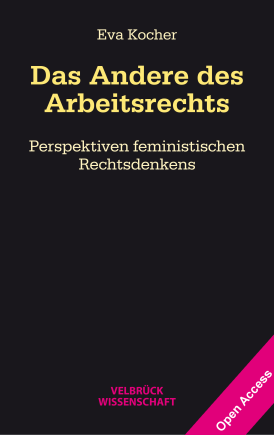
19. Mai 2025, 18:15 Uhr: "Das Andere des Arbeitsrechts", Book Launch mit Eva Kocher (Europa-Universität Viadrina Frankfurt (Oder))
Recht ist geprägt durch vergeschlechtlichte Machtverhältnisse: Marginalisiert wird, was nicht ›männlich‹, also ›anders‹ ist. Dies gilt in besonderer Weise für das Arbeitsrecht. Klassische Felder feministischer Interventionen wie Diskriminierung, Elternschaft und Sorgearbeit sind hier von unmittelbarer Bedeutung.
Dervorliegende Band von Eva Kocher versammelt Beiträge aus mehr als zwanzig Jahren Forschung über »das Andere des Arbeitsrechts«. Die Texte weisen auf die Relevanz feministischer und queertheoretischer Debatten allgemein für das Recht hin und legen die Chancen, aber auch Schwierigkeiten einer interdisziplinären Rechtswissenschaft dar. Vor diesem Hintergrund werden konkrete Probleme der rechtlichen Normalisierung vergeschlechtlichter Lebens- und Arbeitsverhältnisse ebenso in den Fokus gerückt wie das gespannte Verhältnis von individuellen Arbeitsrechten und kollektiver Solidarität sowie Fragen des Antidiskriminierungsrechts.
Eva Kocher ist seit 2009 Professorin für Arbeitsrecht an der Europa-Universität Viadrina Frankfurt (Oder) und leitet dort das Center for Interdisciplinary Labour Law Studies. Sie ist Redakteurin der Zeitschrift Kritische Justiz und leitete die Expert:innenkommission zum Zweiten Gleichstellungsbericht der Bundesregierung.

03. Februar 2025, 18:15: Wilde Demokratie (Wagenbach), Book Launch mit Tim Wihl (Universität Erfurt)
Freisprüche für politischen Aktivismus sollten keine Gnadenakte sein, sondern verfassungsrechtlicher Anspruch. Tim Wihl erklärt, wie Recht demokratiefördernden Dissens ermöglichen statt verhindern könnte.
»Völlig bescheuert« nannte Bundeskanzler Scholz die Aktionen der Klimaaktivisten »Letzte Generation«. Andere verurteilen den zivilen Ungehorsam der Umweltschützer gar als »Terror«, mittlerweile wird gegen den verhassten Protest sogar mit Präventivhaft vorgegangen.
Entgegen der landläufigen Meinung, die solche wilden Protestformen als antidemokratisch abkanzelt, macht der Rechtswissenschaftler Tim Wihl in seiner präzisen Analyse deutlich, dass gerade diese Aktionen entscheidend zur Stärkung und Legitimierung der Demokratie beitragen.
Wihl untersucht verschiedene Protestformen von Adbusting über Massendemonstrationen bis hin zu Besetzungen und Blockaden. Er vergleicht die Chancen politischer Freiheit in Deutschland, Frankreich, den USA oder Chile. Und er zeigt, dass das deutsche Protestrecht wesentlich an die Verfassung der Kaiserzeit anknüpft – und nicht etwa an das fortschrittliche Erbe der Revolution von 1918.
Entschieden plädiert Wihl dafür, einem alternativen Verfassungsdenken zum Durchbruch zu verhelfen. Denn ziviler Ungehorsam ist keine Straftat, sondern eine demokratische Errungenschaft.
Die Veranstaltung ist Teil der Reihe LSI Berlin Book Launch.

16. Dezember 2024, 18:15: "Enduring Enmity. The Story of Otto Kirchheimer and Carl Schmitt", Book Launch mit Hubertus Buchstein (Universität Greifswald)
To date, the relationship between Otto Kirchheimer and Carl Schmitt has invariably been described as friendly, despite their political differences. Kirchheimer has even been attributed the role of the godfather of today's left-Schmittianism. With reference to previously unknown archival materials, conversations with personal contacts, and through a new reading of the theoretical works of both authors, including an analysis of the Nazi vocabulary used by Schmitt, Hubertus Buchstein exposes this view as a politically motivated legend. Buchstein claims that the best way to characterize their relationship from their first meeting in Bonn in 1926 up until Kirchheimer's death in 1965 is as enduring enmity – in a political, a theoretical, and even a personal sense.
Die Veranstaltung findet auf deutsch statt. Sie ist Teil der Reihe LSI Berlin Book Launch und wird mit dem Lehrstuhl Theorie der Politik (Prof. Dr. Christian Volk) kooperativ veranstaltet.
05. Dezember 2024, 18:15: "Safe Access to Asylum in Europe" und "Die Heimat der Anderen", gemeinsamer Book Launch mit Pauline Endres de Oliveira (Humboldt-Universität zu Berlin) & Valentin Feneberg (Universität Lüneburg)
Ohne Zugang zum Aufnahmestaat kein Asyl. Doch aufgrund fehlender Zugangswege, kommt es zum ‚Asylparadox‘: Schutzsuchende müssen staatliche Grenzen irregulärer übertreten, um Schutz zu erlangen. In ihrer Studie Safe Access to Asylum in Europe analysiert Pauline Endres de Oliveira verschiedene Arten sicherer Wege zum Schutz in der EU und untersucht, wie sich diese Wege auf das Asylparadox auswirken. Dabei geht es auch um das Zusammenspiel zwischen Zugang und Rechten nach Einreise.
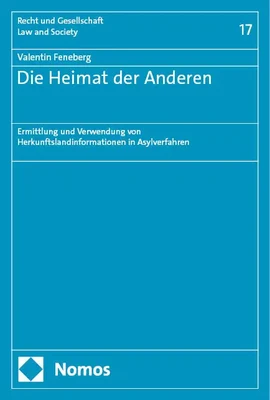
Nach dem Zugang ist vor dem Asylverfahren, und das ist voller Wissenslücken. Um Asylentscheidungen zu treffen, müssen Behörden und Gerichte die Lage in den Herkunftsstaaten kennen und einschätzen. In seiner Studie Die Heimat der Anderen untersucht Valentin Feneberg an den Beispielen Syrien und Afghanistan, wie Gerichte Landeswissen ermitteln und auf Basis der gleichen Herkunftslandinformationen die Lage vor Ort unterschiedlich bewerten.
Die Veranstaltung ist Teil der Reihe LSI Berlin Book Launch.
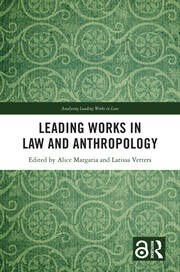
18. November 2024, 18:15: "Leading Works in Law and Anthropology", Book Launch mit Alice Margaria (Universität Zürich) & Larissa Vetters (MPI Halle)
The academic disciplines of law and sociocultural anthropology have a long but at times contentious history of drawing on each other in order to study and understand law and human experience in its diverse manifestations. This volume provides an innovative and engaging format by giving established and emerging scholars from diverse jurisdictions the opportunity to discuss and reflect upon what they consider to be a ‘leading work’. The collection offers a unique, multi-perspectival reconsideration of the intellectual history of the field whilst also addressing issues that are at the core of interdisciplinary legal research. Contributions shed light on the changing nature of cross-disciplinary research and collaboration, trace how disciplinary understandings of normativity have cross-fertilised each other, and reflect on choices taken within research on law and anthropology along a continuum of theoretical reflection, critique, engagement, and practical application. The book elaborates on the nature and the boundaries of law and anthropology research, as well as on its likely future development in light of the insights shared by contributors on their chosen leading works. The book will make fascinating reading for researchers and academics in both law and anthropology.
Die Veranstaltung ist Teil der Reihe LSI Berlin Book Launch.

02. Juli 2024, 18:15: "Antisemitismus und Recht. Interdisziplinäre Annäherungen" (transcript), Book Launch mit Christoph Schuch (HU Berlin)
Was heißt es, über Antisemitismus und Recht nachzudenken? Aus interdisziplinärer Perspektive betrachten die Beiträger*innen erstmals die Zusammenhänge dieses Forschungsfelds. Zugänge aus unterschiedlichen Disziplinen wie unter anderem der Geschichtswissenschaft, Philosophie, Soziologie, Literaturwissenschaft und Rechtswissenschaft schließen erste Lücken, zeigen aber auch Probleme, Herausforderungen und Desiderate auf. Der Band schafft somit nicht zuletzt Grundlagen für ein verstärktes Wissen im Hinblick auf Antisemitismus in Rechtswissenschaft und -praxis.
Auf der Veranstaltung diskutieren Christoph Schuch (HU Berlin), Reut Yael Paz (JLU Gießen), Greta Göbel (RKU Heidelberg), Martin Heger (HU Berlin), Christoph Jahr (HU Berlin) und Markus Weiß (TU Berlin).
Die Veranstaltung ist Teil der Reihe LSI Berlin Book Launch und wird mit dem Freie Universität Empirical Legal Studies Center (FUELS) kooperativ veranstaltet.
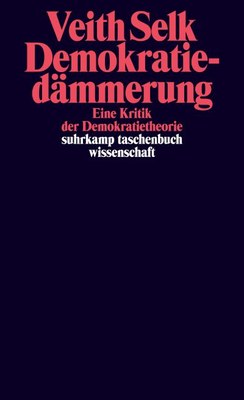
14. Mai 2024, 18:15: Demokratiedämmerung. Eine Kritik der Demokratietheorie (Suhrkamp), Book Launch mit Dr. Veith Selk (Technische Universtität Darmstadt)
»In der Theorie vielleicht eine gute Idee, versagt nur leider in der Praxis!« Was früher vom Kommunismus gesagt wurde, gilt heute für die Demokratie – sie wirkt zunehmend unglaubwürdig. Veith Selk zeigt in seinem scharf analysierenden Buch, warum sowohl die demokratische Politik als auch die sie begleitenden Demokratietheorien an der Wirklichkeit scheitern. Zwei Thesen werden dabei verfolgt: Der Niedergang der Demokratie ist keiner Regression geschuldet, sondern das Ergebnis der gesellschaftlichen Fortentwicklung. Das damit eingeläutete Ende der Demokratie führt auch zum Verfall der Demokratietheorie, die als akademische Disziplin anachronistisch wird.
Die Veranstaltung ist eine Kooperationsveranstaltung mit dem Lehrstuhl Theorie der Politik von Prof. Christian Volk und ist Teil der Reihe LSI Berlin Book Launch.
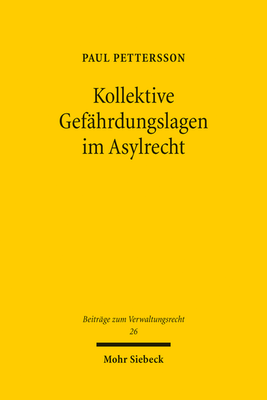 21. November 2023, 18.15 Uhr: Kollektive Gefährdungslagen im Asylrecht (Mohr-Siebeck), Book Launch mit Dr. Paul Pettersson (Forschungsstelle Migrationsrecht Halle-Saale)
21. November 2023, 18.15 Uhr: Kollektive Gefährdungslagen im Asylrecht (Mohr-Siebeck), Book Launch mit Dr. Paul Pettersson (Forschungsstelle Migrationsrecht Halle-Saale)
Im Asylrecht werden gleiche Tatsachenfragen von den Gerichten häufig unterschiedlich beantwortet. Die Uneinheitlichkeit betrifft ‚kollektive Gefährdungslagen‘ wie die Gefährdung syrischer Wehrdienstentzieher oder alleinstehender Männer in Afghanistan. Paul Pettersson verdeutlicht anhand eines Korpus von Gerichtsentscheidungen zum Irak die große Bedeutung kollektiver Gefährdungslagen für die asylrechtliche Gefahrenprognose und leitet zu einer systematischen Prüfung an. Anschließend stellt er mit Methoden der juristischen Netzwerkanalyse den Kommunikationsprozess der Gerichte über Länderleitentscheidungen dar. Die neue Tatsachenkompetenz des BVerwG wird aus Sicht des Autors die grundlegenden Probleme nicht lösen. Stattdessen sollte die diskursive Aushandlung der Tatsachenfragen zwischen den Gerichten und dem BAMF gestärkt werden. Die Dissertation ist online hier verfügbar (open access).
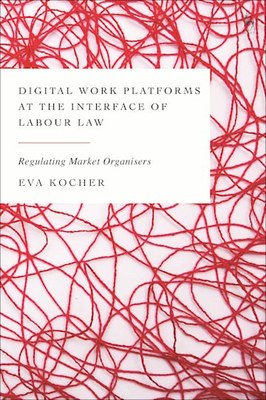 12. Dezember 2023, 18.15 Uhr: Digital Work Platforms at the Interface of Labour Law. Regulating Market Organisers (Bloomsbury Publishing), Book Launch with Prof. Dr. Eva Kocher (European University Viadrina)
12. Dezember 2023, 18.15 Uhr: Digital Work Platforms at the Interface of Labour Law. Regulating Market Organisers (Bloomsbury Publishing), Book Launch with Prof. Dr. Eva Kocher (European University Viadrina)
Diese Veranstaltung findet auf Deutsch statt.
This book shows how to design labour rights to effectively protect digital platform workers, organise accountability on digital work platforms, and guarantee workers' collective representation and action. It acknowledges that digital work platforms entail enormous risks for workers, and at the same time it reveals the extent to which labour law is in need of reconstruction.
The book focusses on the conceptual links – often overlooked in the past – between labour law's categories and its regulatory approaches. By explaining and analysing the wealth of approaches that deconstruct and reconceptualise labour law, the book uncovers the organisational ideas that permeate labour law's categories as well as its policy approaches in a variety of jurisdictions. These ideas reveal a lack of fit between labour law's traditional concepts and digital platform work: digital work platforms rarely behave like hierarchical organisations; instead, they more often function as market organisers.
The book provides a fresh perspective for international academic and policy debates on the regulation of digital work platforms, as well as on the purposes and foundations of labour law. It offers a way out of the impasse the debate around labour law classification has reached, by showing what labour law could learn from digital law approaches to platforms – and vice versa.
Das Buch ist hier zu erhalten (open access).
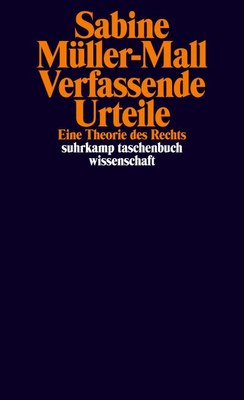 17. Januar 2024, 18.15 Uhr: Verfassende Urteile: Eine Theorie des Rechts (Suhrkamp), Book Launch mit Prof. Dr. Sabine Müller-Mall (Technische Universität Dresden)
17. Januar 2024, 18.15 Uhr: Verfassende Urteile: Eine Theorie des Rechts (Suhrkamp), Book Launch mit Prof. Dr. Sabine Müller-Mall (Technische Universität Dresden)
Gerichte nehmen mit ihren Urteilen großen Einfluss auf Verfassungsentwicklungen. Wie aber können diese Urteile Verfassungen erweitern, verdichten oder verändern? Und was heißt es überhaupt, rechtlich zu urteilen? Um verfassende Urteile über ihre Rechtsförmigkeit zu erklären, rekonstruiert Sabine Müller-Mall in ihrem scharfsinnigen Buch Verfahren juridischen Urteilens. Sie entwirft nicht nur eine grundlegende Perspektive auf den Zusammenhang von Recht und Konstitutionalisierung, sondern auch eine Theorie des Rechts, die das Urteilen zum Ausgangspunkt nimmt.
 13. Juni 2023, 18. 15 Uhr: When the People Rule: Popular Sovereignty and the Future of Liberal Democracy, Book Launch with Ewa Atanassow, Dieter Grimm and others
13. Juni 2023, 18. 15 Uhr: When the People Rule: Popular Sovereignty and the Future of Liberal Democracy, Book Launch with Ewa Atanassow, Dieter Grimm and others
The idea and ideal of popular sovereignty, which has served to ground the liberal democratic order and to legitimize power in the modern world, has come under increasing pressure in recent decades. On the one hand, the rise of populism, often illiberal or authoritarian, has undermined minority rights, individual autonomy, and the rule of law. On the other, the expansion of international institutions and greater reliance on market and non-governmental organizations have gradually insulated large areas of policymaking from democratic contestation and popular control. Together, these developments cast doubt on the viability and the very coherence of liberal democracy as a constitutional model.
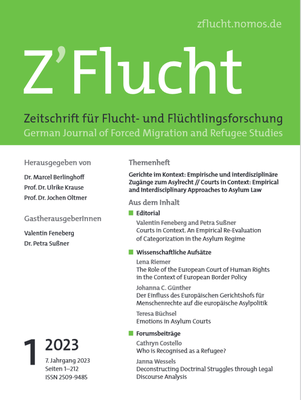
23. Mai 2023, 18.15 Uhr: Gerichte im Kontext. Empirische und interdisziplinäre Zugänge zum Asylrecht. Special Issue der Zeitschrift für Fluchtforschung
Aus dem Editorial: The international order is based on the fundamental belief that nation-states can control access to their territories. Asylum law puts this logic into perspective by guaranteeing fair procedures to those seeking protection and, if accepted, basic civil and social rights. Asylum practice thus operates in a tension between universal human rights and migration control, part of which is the categorization of people according to their needs for protection. International and national courts are key actors mediating this tension. By applying and interpreting the law, they contribute to the dynamic evolution of both substantial and procedural asylum law. The aim of this special issue is to empirically analyse the legal practice of categorization from different disciplinary perspectives and thus contribute to interdisciplinary asylum law research.
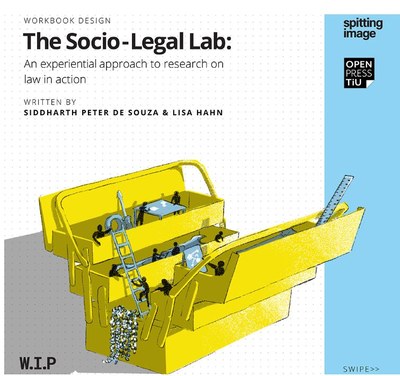 29 November 2022, 6.15 pm: The Socio-Legal Lab: An Experiential Approach to Research on Law in Action, with Siddharth de Souza and Lisa Hahn
29 November 2022, 6.15 pm: The Socio-Legal Lab: An Experiential Approach to Research on Law in Action, with Siddharth de Souza and Lisa Hahn
Are you interested in exploring socio-legal research methods and are looking for guidance on how to do so? The interactive workbook “The Socio-Legal Lab: An Experiential Approach to Research on Law in Action” is designed to accompany researchers on their way through a socio-legal research project. The book employs the idea of a “lab” as a space for interactive and experiential learning. In that spirit, the talk will give an overview of the book, but will do so in an interactive manner by trying out selected exercises with the audience.
 15 November 2022, 6.15 pm: The European Court of Human Rights: Current Challenges in Historical Perspective, Panel Discussion with Helmut Aust, Esra Demir-Gürsel, Başak Çalı, Silvia Steininger, and Nicola Wenzel
15 November 2022, 6.15 pm: The European Court of Human Rights: Current Challenges in Historical Perspective, Panel Discussion with Helmut Aust, Esra Demir-Gürsel, Başak Çalı, Silvia Steininger, and Nicola Wenzel
This panel discussion will revisit the edited volume on the European Court of Human Rights: Current Challenges in Historical Perspective (Edward Elgar, 2021) edited by Helmut Aust and Esra Demir-Gürsel. The volume has addressed authoritarian entrenchment and political critique of the Court – two of the current challenges facing the Court which usually attract debates on the original intent of the European Convention on Human Rights and the limits it imposes on the Court. The contributors of the volume investigated the interplay between the past and present in the Court’s case law and the governmental critiques of the Court to address these two challenges. This panel will reconsider the discussions in the volume in light of the developments that took place after its publication in April 2021, in particular Russia’s war of aggression against Ukraine and the following exclusion of Russia from the Council of Europe.


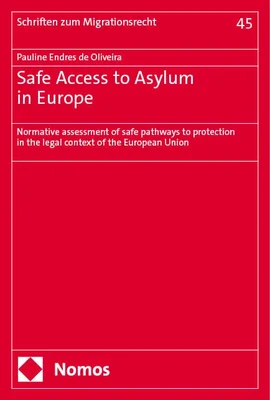
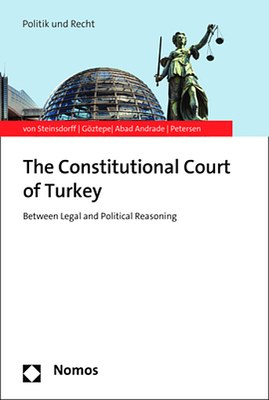 6 February 2023, 6.15 pm:
6 February 2023, 6.15 pm: